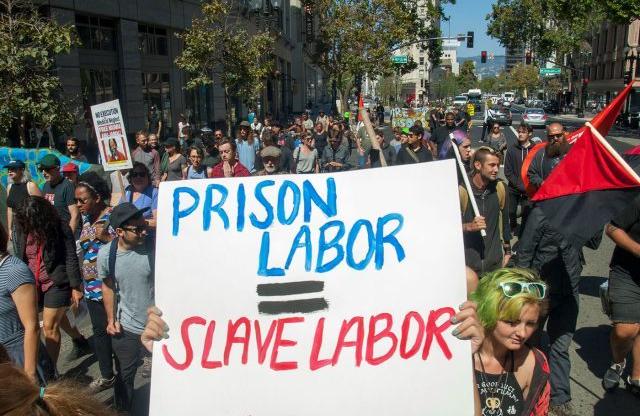Prisoners sue Alabama, charging ‘modern day slavery’
 By Zoe Johnson
By Zoe Johnson
A group of current and former inmates sued the state of Alabama on Dec. 12, 2023, challenging the prison convict labor program, which the lawsuit describes as a “modern-day form of slavery.” The Union of Southern Service Workers, a Service Employees Union (SEIU) affiliate, and the Retail, Wholesale and Department Store Union signed on as co-plaintiffs. The lawsuit claims that incarcerated workers “have been entrapped in a system of ‘convict leasing’ in which incarcerated people are forced to work, often for little or no money.” The plaintiffs said their labor has generated massive profits for both private and government entities.
The complaint details the coercive nature of the prison labor programs. According to the prisoners, they “live in a constant danger of being murdered, stabbed, or raped…” Moreover, when inmates refuse to work due to health concerns, they are subjected to solitary confinement and ineligibility for parole. Gov. Kay Ivey, Attorney General Steve Marshall, the head of the Alabama Department of Transportation, and the Alabama Department of Corrections (ADOC), are all named in this lawsuit.
The lawsuit is seeking changes to the parole system immediately for folks to be paroled. It asks for back pay for the workers affected and for an end to the system immediately.
Corporations profit from forced prison labor
The plaintiffs said they are regularly forced by the ADOC to work at McDonald’s, Kentucky Fried Chicken, Wendy’s, Burger King, Anheuser-Busch, auto-manufacturers and meat processors. The inmates also work for the cities of Montgomery, Troy, and the Alabama Department of Transportation.
In 2023, the state of Alabama made an estimated $450 million from the “convict leasing” system. The complaint discloses that most inmates are paid less than the minimum wage. The Department of Corrections takes 40% of the inmates’ total earnings, before taxes, child support, restitution, and other deductions. Furthermore, prisoners are responsible for personal expenses such as meals, transportation to the job and laundry for the job. A 40-hour work week yields less than $90.
The complaint points out that the prison population in Alabama is disproportionately Black, and that while Black people make up only 26% of the state’s population, they account for 54% of the prison population.
Plaintiffs and local civil rights leaders understand these prison conditions as a continuation of post-Reconstruction era policies, including forced sharecropping. The complaint states that it is “no accident that the people caught in a labor-trafficking scheme are Black,” and that prisoners are “like individuals who were enslaved and forced to work Alabama’s cotton fields, and those forced to participate in the sharecropping and convict leasing schemes that followed the end of the Civil War.”
While the convict leasing system was banned by Alabama in 1928, the tenuous language of state and federal laws regarding the practice mean that prisons still engage in convict leasing. Perhaps the most egregious loophole that United States prisons and corporations utilize to sustain their labor-trafficking schemes is the 13th Amendment, which bans slavery and involuntary servitude “except as a punishment for a crime.”
In 2022, Alabamans voted to remove language in their state constitution that permits slavery as a criminal punishment. Jacob Morrison and Adam Keller, union members and hosts of the Valley Labor Report, Alabama’s only union radio talk show, discussed the lawsuit as it relates to the larger U.S. labor movement.
Morrison and Keller explained that the state’s inmates have historically been used as a reserve army of laborers that replace free workers attempting to organize. Morrison and Keller revealed that bosses often threaten to displace workers by leasing out convicts for much cheaper. Morrison and Keller responded to criticisms about the workers’ felon status by reiterating that Marx said, “workers of the world unite,” not “some workers unite.”
The trial date has not been set.

